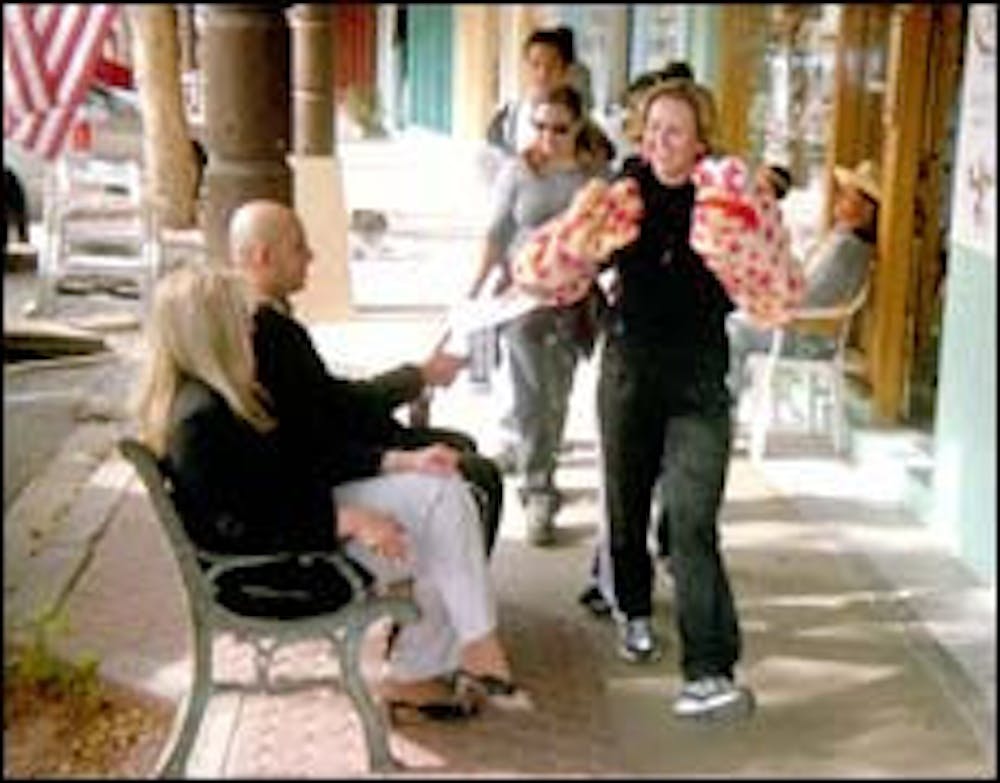Lisa Fujii was among the horde of shoppers who jammed into Scottsdale Fashion Square mall on Friday morning.
The ASU West communication senior was not there to hunt for bargains, but rather to protest and educate.
"Happy Buy Nothing Day," Fujii said cheerfully as she distributed fliers in the mall's food court. "Have a happy holiday, too. Just remember what it's all about - spending time with your family."
Fujii was one of several ASU students who took part in "Buy Nothing Day," a nationwide campaign against consumerism and the buying frenzy that occurs during the holiday season.
Fujii was joined by Ellie Kumayama, an ASU West communication senior who helped distribute "Christmas gift exemption vouchers" that symbolically freed shoppers from the obligation of buying presents.
Activists like Fujii and Kumayama gathered at malls and retail stores both in the Valley and nationwide and urged shoppers to avoid the biggest shopping day of the year.
Instead of fighting tooth-and-nail to grab the latest toys, they said consumers would be better off spending time with friends and family.
"Christmas has become just about consumerism instead of family," she added. "It's more important to give gifts to people than it is to just show up."
The annual campaign was the brainchild of Adbusters, a Canadian social activism collective that publishes a bi-monthly magazine. Since its debut in the Pacific Northwest in 1992, the campaign has grown into a worldwide movement and is described as a "celebration of consumer awareness and simple living."
Fujii and Kumayama wanted to make their protest fun, so they brought along "Consumer Monster" puppets, multicolored doppelgangers of Sesame Street's Cookie Monster. The puppets symbolized shoppers who tend to spend irresponsibly.
The pair used the puppets to interact with shoppers and communicate their message without hostile confrontation.
They managed to traverse the mall for about 90 minutes before mall security asked them to leave. The group then went to downtown Scottsdale to spread their message to shoppers at the galleries and boutiques there.
"We weren't attacking people ... we just wanted people to take a step back and see how wasteful and how much money we kind of throw away at stuff in our culture," Kumayama said. "This wasn't about anarchy at all. I'd just settle for communication."
Another ASU student involved in the protest took things a step further, however.
Psychology junior Nathan Walsh and two friends commandeered the public address system at a Wal-Mart store near 75th Avenue and McDowell Road in Phoenix. They delivered a 30-second plea urging customers to leave and not "be a slave to corporate culture."
The declaration went mostly unnoticed, both by shoppers and Wal-Mart employees, as only a handful of shoppers were aware of the diatribe amidst the usual announcements over the store's P.A. system.
Despite the apathy, local participants believe they were successful in communicating their message.
"I think we at least woke some people up, and they started to think, which is hard to do," Walsh said. "I think when people are going shopping, especially at someplace like Wal-Mart, I think they just go into the mob mentality."
Kumayama said awakening consumers to this kind of behavior might help create more conscious consumers and prevent situations similar to when a 41-year-old Florida woman was trampled by a melee of frantic shoppers as she attempted to purchase a DVD player at a Wal-Mart in Orange City, Fla., on Friday.
Dave Wells, a senior lecturer in ASU's Bachelor of Interdisciplinary Studies Program, said buying more during the Christmas season ultimately helps the economy but has negative effects on our culture.
"Retailers have been quite effective in making it necessary to show people you love them by buying them a gift," Wells said. "It's basically choosing to represent yourself through things you've purchased rather than through having really solid interactions with other people."
Although the grassroots efforts of participants are miniscule when compared with the multibillion-dollar retail industry, Wells said the campaign is a "nice symbolic gesture" counterbalancing the feeding frenzy of the holiday season.
Reach the reporter at benjamin.leatherman@asu.edu.




